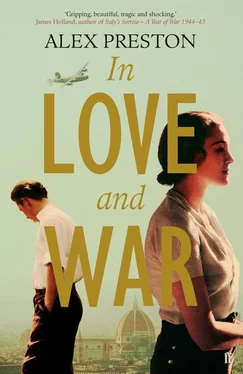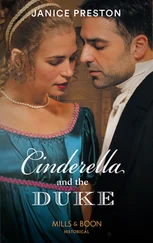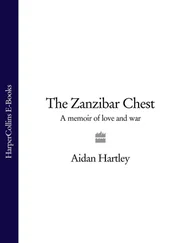He even has time, on his journey to the hard earth, to marvel at the workings of the mind, where this forgotten image from his youth has arrived, unbidden, and filled his heart with sorrow and joy. And now, as if the dog, whose mottled fur and wet nose he can see with extraordinary clarity, there beside him, has unblocked some obstruction, a flood of love comes. Anna speaking gentle words in his ear; Philip in the foliage at Cambridge, the sound of rain on leaves; Fiamma and Gerald in the island-studded river. He pictures Douglas and Orioli, Mosley and his father swinging him between them as a child, his mother burning books in a field, and he loves them all. Now the parade of figures wisps across the cyclorama of his mind, the Unfinished Symphony loud around them, the city’s angels peeling themselves from the bridges and loggias. St John and Mary Magdalene dance, wild-eyed, sweeping their tattered robes about them, Mary’s hair like a russet river. And Ada — and he swells at the thought of her, and the last thing he does, before the ground rushes up, is to send arrowing towards her everything that is left of his strength.
As he dies, he realises that the last few months of his life have been spent chasing after the wrong thing. His father’s idea of pluck. But he knows he has done enough, and that it doesn’t matter. Carità hits the ground first, a wet thud. Esmond feels himself turn inside himself and can now see the largeness of the palpitating earth, the depth of human love, the stars in the firmament, Ada singing gently into the sulphurous sky. As he draws his last breath, he realises that this is the thing: this is joy and courage and hope. Ada. A feeling of extraordinary peace washes over him, a feeling of bliss. Ada. Blackness.
Excerpt from In Love and War, the Autobiography of Rudyard Lowndes (Faber & Faber, London, 1956)
The morning after we arrived in Florence, I was up early, keen to be out in the city. It had been a wheeze the night before — the bells of the great church ringing, gunshots echoing in the hills, German stragglers to be mopped up, toasts drunk with jubilant partisans. From midnight to 2 a.m. I oversaw a team of sappers clearing mines from the road leading up from the Ponte Vecchio towards the Piazza della Signoria. I recognised the names from Esmond’s letters, from the broadcasts we used to listen to, all of us clustered around the wireless in the library at Welsh Frankton.
It was a very luminous morning as I walked out of the villa where we’d stationed ourselves, a good-looking place called L’Ombrellino that sits on the hillside overlooking the town. There were already younger coves splashing in the murky pool in the garden, others smoking on the terrace. I enjoyed the walk down towards the river, swinging my arms with a tra-la-la. In the city proper I slowed down, picking carefully through the rubble of the via de Guicciardini. British squaddies are the best there are, but I’d seen too many chaps with misplaced limbs in military hospitals, with the hangdog expression of blighters who’d made a frightful hash of something quite simple. I’d got this far by being a trifle slower and a trifle more careful than other fellows. I wasn’t going to stop now.
I sat down halfway along the Ponte Vecchio, where there’s a break between the jewellers and leather shops, all boarded up, empty and windowless, of course. I eased myself onto the little stone bench there and pulled out a cigarette. There’s nothing quite like the first fag of the day. Soldiers thrive on routine, and one of mine was to clear a moment of peace for a smoke, even if it meant getting up earlier than other chaps. Taking a dekko downriver, I could see the blasted ruins of the next bridge — the Ponte Santa Trinità — lying just below the surface. Here and there a jagged piece of stone would break through, causing a flurry of white water. Further away, past the remains of another blown-up bridge, lay the pontoon we’d constructed to get our men and their tanks onto the north side of the river.
When I’d finished my cigarette, giving a nod of thanks to Herr Hitler for ordering that this bridge, at least, be preserved by his retreating troops, I set out into the city proper. It was astonishingly intact given that I was standing where, less than twenty-four hours earlier, the enemy had been. Walls riddled with bullet holes, a burnt-out Kübelwagen in front of that famous statue of David, a dead paratrooper — one of the Green Devils — lying quite serene in the middle of the great, empty square in front of the town hall. But it seemed as if the Germans had more or less respected the unofficial Open City. Apart from the bridges, of course. I wandered haphazardly until I found the rebel headquarters in the Piazza San Marco, where members of the Resistance had taken over rooms in a convent formerly used by the SD. A filly, blonde hair, was brought to me in the cloisters of the church. Name was Tosca Buccarelli. She offered to escort me back over the river to the Allori Cemetery, to Esmond’s grave.
As we walked through the city, she told me about my brother’s war, or as much as she knew of it. About the assassination of a Fascist colonel, attacks on train lines, scores of refugees saved from the hands of first the Blackshirts, and the Nazis. She told me about a girl, Ada Liuzzi, a Jew who’d been taken north to a camp by the Germans, with whom my brother had lived, to whom he’d been engaged. She told me about the two other members of the Resistance who’d been, with my brother, a trio of unlikely heroes — two Communist students and a foppish Englishman. She told me about a capture, a rescue attempt that went wrong, a tragic ending.
I must say I didn’t recognise the fellow she was talking about, but then I dare say he wouldn’t recognise me if he was looking down as I made my way between the cluttered rows of the cemetery, where the graves jostle and slant amid the cypresses. His body, it seems, was badly broken by the fall and the chopping and slicing he’d suffered at the hands of this Carità and so he’d been cremated, his ashes scattered on the Arno. There is a modest gravestone.ESMOND LIONEL LOWNDES
21ST MAY 1917–25TH JULY 1944
I stood, thinking of all the life, all the love, contained in that single engraved hyphen, and I placed down a nosegay of flowers I’d picked as we strolled through the cemetery. Tosca was crying beside me, this brassy, voluptuous girl, crying over dear old Esmond. I hardly knew him, or at least the person he’d become — Tosca knew him better — but I, too, loved him. And I thought of all the lives he’d touched, the web of affection he’d weaved that stretched from Shropshire to Cambridge to Italy to who knows elsewhere, and deep under the earth to all those who’d died before. I thought of the girl, Ada, in Auschwitz, perhaps not yet aware that my brother, her lover, was dead. I said a prayer for her there on the consecrated ground, that she might make it through alive.
Then I walked out of the gatehouse and up towards the river, Tosca at my side, and we spoke of Esmond, and of the days of freedom ahead, and the great bells of the Duomo began to chime, and then the bell of the Palazzo Vecchio, which they call La Vacca, and I could see the bevelled red roofs in the bright August light, the churches clamouring skywards, the sculptures and tabernacles and all the ravishing splendour of the place and I carried my love for my brother in my heart like a flame into the streets of the city he called home. Florence.
Thanks to the following, without whom this book would have been longer, less accurate or never written at all: my editors, Walter Donohue and Matt Shoard, and my agent, Anna Power. To all at Faber & Faber, particularly Hannah Griffiths, Lee Brackstone and Kate McQuaid. To Silvia Crompton, who held it all together (in exchange for wine). To all at Johnson & Alcock, particularly Ed Wilson. To Glenn Haybittle and Penny Mittler, two inglesi italianati, who were there at the beginning and at the end. To Enrico Giachetti, for priceless first-hand recollections of Firenze Fascistissima . To Michael Brod and the Palazzo Tornabuoni, for their hospitality. To all at St Mark’s Anglican Church, where all of this started. To James Holland, for making sure that my errors in military history were chosen rather than accidental. To Mark Miller and de Havilland Support Ltd for a wonderful day with the Dragon Rapide. To Gerald Wells and the British Vintage Wireless and Television Museum, for their endless patience. To Neil Gower, for the stunning illustrations. To Emma Smith, for strong women. To Damian Barr, Emer Gillespie, Tom Edmunds, Helen Benckendorff, Florence Ballard and Ele Simpson, for their early, insightful and encouraging readings. To my grandfather and my parents, for inspiration past and present. Finally, as ever, to Al, Ray and Ary, with endless love.
Читать дальше












